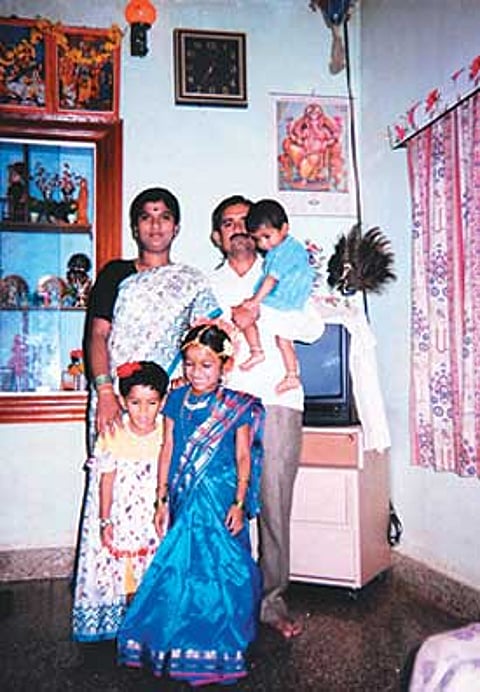Powered By A PhD
Krishnappa’s father caught mosquitoes, he himself became a mechanic. What altered his life was affirmative action.
The route to mobility began for Krishnappa, as for millions of Indians, with a government job. From an ordinary mechanic in the Karnataka State Road Transport Corporation (KSRTC), he made his way up to the middle ranks of the state bureaucracy, retiring as an assistant regional transport officer. But that’s not the end of his story, indeed, not even perhaps a midway point. The man is also an MA and PhD in Kannada literature; an award-winning author of five books of literary criticism; the husband of Sarojamma, a housewife who did her MA in Kannada literature with his active encouragement after all her three children had grown up; and the father of Trupti, Shantala and Sriganga, bright students all, now scaling professional heights in the private sector in India or abroad.
The family’s story becomes all the more remarkable when you step back a generation and meet Krishnappa’s parents: H. Gangaiyah, owner of a small patch of monsoon-dependent land in Cholanayakanahalli village near Bangalore, who found himself turning, out of economic distress, into a catcher of mosquitoes; and his wife Savitramma. Agricultural failures having driven them to poverty, the couple migrated to Bangalore at a historical juncture, in the 1950s, when the city was being dressed up as a state capital. “They knew nobody except for a distant relative. With his help, my father found a job in the municipal corporation as a head gangman in the malaria department,” says Krishnappa.

One from the album, the family in the eighties |
Vitally, however, Krishnappa’s father, poorly educated himself, had access to free schools run by the municipal corporation, and was able to educate his six children. After school, they helped their unlettered mother by counting and packing the incense sticks she rolled everyday at their tiny rented home to contribute to the family income. After matriculation, on a relative’s advice, Krishnappa signed up for a course in automobile engineering—without quite knowing what it was—at a government polytechnic. For a couple of years, the Kannada-educated youth struggled with both English, and being short in stature, with heavy machinery too. “I walked three kilometres carrying a huge drawing board from home to college and found it difficult to use the hammer and smithy.” But life would have been considerably harder had he not won a scholarship of Rs 300 per annum for the economically weak. “I purchased the drawing board and also the first pair of folding chairs for our home from that money. Such a thing no longer exists in government colleges,” says Krishnappa.
In 1968, when he completed his diploma, unemployment was rampant. But as luck would have it, around 1970, the KSRTC announced a recruitment drive and Krishnappa got in as an assistant artisan at a salary of Rs 120. But if anything altered the trajectory of the Krishnappas, it was the fact that the 1970s were the most revolutionary times in the history of Karnataka. Chief Minister Devraj Urs initiated land reforms and announced reservations for backward classes. As a result of this new state policy, in 1978, Krishnappa, who was able to pass his Karnataka Public Service Commission exams, was offered the job of an inspector in the Regional Transport Office. “I was a direct beneficiary of Urs’s visionary reservation policy,” says Krishnappa. His financial position improved steadily from then on. “Our relatives who had abandoned us started coming back to us.”
Although Krishnappa now earned a comfortable salary, his hunger for professional growth did not cease. He obtained a BA through a distance education programme and attended an evening college to get a law degree. His MA happened in 1995 and a PhD followed in 2002. The journey has, of course, been easier for his children—they did not have to struggle as hard, either for material success or the acquisition of cultural capital. “I knew what magic education had done in my life, so I paid a lot of attention to their learning,” he says. Today, elder daughter Trupti is an mca, his second daughter Shantala a BE in Electronics and Communication and son Sriganga a BE in Information Technology. While Shantala has been working for slk Software and is the first in the family to go abroad to work to Cincinnati in the US, the son has joined the prestigious transnational company Accenture. Krishnappa also chose educated sons-in-law for his daughters. His first son-in-law, H.M. Mohan Kumar, is a PhD in Genetics while his second son-in-law, B.G. Jayakumar, is a software engineer.
With this generation, too, however, Krishnappa emphasises, it’s not just individual talent and hard work but progressive policies that have mattered. Specifically, the Common Entrance Test (CET) process introduced in Karnataka in the early ’90s, which made admissions to professional colleges in the state not just transparent, but also democratised them. The Krishnappas benefited from a rational fee structure and, once again, from a prudent reservation system. “I’m truly grateful to people who introduced CET in the state. It has benefited lakhs and lakhs of children like ours,” says Krishnappa. What is truly remarkable about Krishnappa’s story is that it is not just his. It is also, in key respects, the story of many other backward class families in the state—defining themselves anew on the social map by shrugging off the inertia accumulated over centuries. There doubtless exist numerous instances where India didn’t work, but here the State and the individual were perfectly matched in intent.
Tags